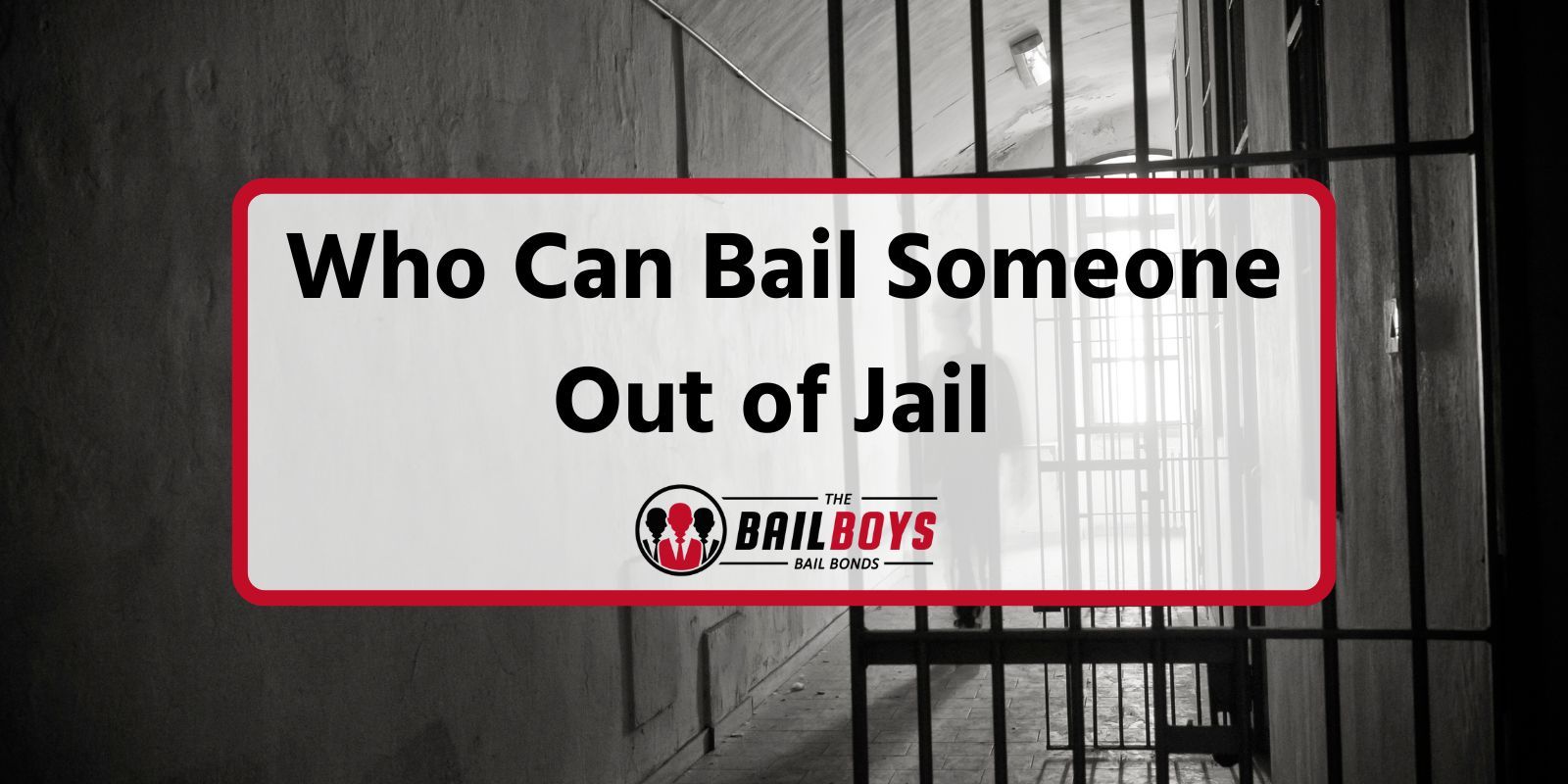
Who Can Bail Someone Out of Jail?
Bail is a legal system designed to prevent the detention of arrested persons whom the jury may eventually acquit. In California, it is a process where a judge releases an arrested individual from custody under certain conditions to ensure they appear in court for further legal proceedings pending trial.
Generally, the bail process begins with an arrest, booking, initial court appearance, bail hearing or arraignment, bail posting, and release. However, there are specified requirements and eligibility criteria regarding who can post bail on a defendant’s behalf. Here, let’s explore the different categories of people legally eligible to bail someone and the factors that can influence their eligibility.
Who Exactly Is Able to Bail Somebody Out of Jail?
There are a number of people who potentially could post your bail, from family and friends, to attorney’s, or most often a reputable bail bondsman. A local bail bond company, such as The Bail Boys, will know exactly what to do and who to reach out to in order to post your bail. This often is an advantage as navigating this process alone can become quite complex. For professional assistance from one of our local bondsmen, contact us today.
How Old Do You Have to Be to Bail Someone Out of Jail
In order to bail somebody out, you must be at least 18 years of age by law. In addition to this, this person must possess sufficient knowledge about the defendant (i.e. who you are bailing out), and of course must have the financial capacity to cover the bail amount in addition to meeting the age requirement.

Understanding Bail: A Brief Overview
Bail practice never officially began in the U.S. until about a decade after independence in 1776. In 1789, the U.S. established the Judiciary Act, the first official bail law. The law only authorized bail for alleged individuals whose crimes are not punishable by death.
In 1966, the U.S. legislative body introduced the Bail Reform Act, which allowed the release of accused individuals for free except if there was evidence of flight.
In modern California, the Comprehensive Crime Control Act of 1984 allows a judge to determine eligibility for pretrial release with or without bail based on the defendant’s trustworthiness and potential danger to the community.
In 2018, the state legislature tried to eliminate cash bail, but the American Civil Liberties Union, Human Rights Watch, defenders, and advocates for change voted it out. Meanwhile, California’s Supreme Court issued a $0 cash bail, prohibiting judicial officers from detaining people due to their inability to afford the bail amount.
How the Court Determines Bail Amount
In California, judges first refer to a bail schedule to determine the bail amount if the defendant’s crime is minor. They can increase or reduce the bail amount based on several factors, such as the severity of the crime, flight risk, criminal record, etc.
However, in more complex cases, the judge may conduct an in-depth assessment, considering the defendant’s circumstances. Examples of conditions a judge may consider when determining a bail amount are:
- The nature and severity of the crime: The more serious the crime, the higher the bail amount.
- Criminal history of the defendant: Defendants who have the potential to offend again as shown by their criminal record may have higher bail amount.
- The potential of fleeing before trial: Higher flight risk attracts higher bail amounts.
- Community ties: A defendant’s strong ties with family and employment may reduce the possibility of flight, which may attract a lower bail amount.
- Public safety: Defendants who are potentially dangerous to the public usually get a higher bail amount.
- Financial capacity: People who are financially buoyant may receive a higher bail amount.
The court also determines the defendant’s eligibility for bail based on several factors, which may include:
- Character and reputation of defendants
- Possibilities of defendant’s attendance at all scheduled court proceedings.
- Safety of victims or witnesses to the crime.
- Substance abuse or mental health issues of defendants
- Defendants’ ability to comply with court orders
- Evidence of the defendant’s innocence or weakness in the case

Which Parties are Eligible to Bail Somebody Out of Jail?
Family Members and Close Friends
Anyone can cosign bail with a defendant, whether it’s a friend or family member, in-laws, or other relatives. However, the person must be 18 years or older, know enough about the defendant, and be financially able to pay bail.
Bailing someone out of jail can be emotionally and financially burdensome, especially when it demands taking out a loan or using personal savings or assets as collateral. In a situation where the defendant fails to appear in court, the person who posted the bail may have to forfeit the posted bail amount at their own financial risk.
This may, in general, affect their emotions. Hence, both the defendant and the person posting the bail need to have a proper understanding of the bail conditions and requirements for a successful bail posting.
Bail Bond Agents (Bail bondsmen)
Bail bondsmen can only post bail bonds if they’re licensed by the California Department of Insurance (CDI). They provide financing and secure a defendant’s release without the defendant paying the entire bail amount.
To secure a person’s release through a bail bondsman, you have to contact a bail bond agency and provide the defendant’s name, date of birth, and county of arrest. Bail bonds companies require these data to locate the defendant in the county jail database.
Afterward, the bail bondsman presents the bail bond to the court, pledging to pay the full amount if the defendant does not appear in court as scheduled.
However, some bail bondsmen may require collateral, which defendants may have to forfeit if they fail to comply with pretrial obligations such as attending all court hearings, avoiding contact with victims or witnesses, etc. They usually set a non-refundable premium of about 10% as a fee for their service.
The Bail Boys Offers No Money Down as well as $500 Bail Bonds Throughout California!
The Defendants Themselves
If a defendant doesn’t want to rely on any outside help, they can bail themselves out of jail. This is known as self-bail. To be eligible for self-bail, defendants must have an address in California, be able to afford all or part of the bail amount, and have a low flight risk.
Self-bail begins with a request for it on the first court appearance. The judge then considers factors like flight risk, the severity of the crime, etc., to validate your eligibility. If you are eligible, the judge will grant you the self bail or release you on personal recognizance.
Nevertheless, self-posting cash bail may be a financial burden if you’re not financially stable, and you might forfeit your bail money if you violate any court orders.
Attorneys
Attorneys can post bail for defendants by contacting a bail bond company only with the defendant’s consent. Also, an attorney can post bail if the defendant cannot afford the bond money or if there is an emergency release due to medical needs or family emergencies.

Factors Influencing Who Can Bail Someone Out of Jail
Jurisdiction-specific Regulations
The bail process and the eligibility of those who can post bail vary from state to state. For example, Illinois law disapproves of the use of bail bondsmen for bail posting. This means that no commercial organization can provide financing to release a defendant in Illinois.
Financial Capacity
The affordability of the bail amount, or the bail bond premium, is one of the determining factors of bail poster eligibility. Someone with less financial capacity may not be able to post bail.
Relationship With the Defendant
The court often considers family members or spouses eligible for bail posting. Distant relationships may qualify too, but they may require a more thorough examination.
Criminal History of the Person Posting Bail
If the person to post the bail has past criminal conduct such as a violent offense, probation violation, etc., the court may disqualify or limit their ability to post bail.

Responsibilities After Bailing Someone Out of Jail
After successfully securing a defendant’s release, the bail poster has other post-bail responsibilities, which may include:
Ensuring the defendant attends all court dates
If you eventually bail a defendant out of jail, you must ensure they attend all court-scheduled hearings. You may face legal consequences if the defendant fails to comply.
Understanding potential forfeitures
As a bail poster, you must also understand the possibilities of forfeiting bail money or collateral if defendants fail to attend a court date.
Legal responsibilities and obligations
After successfully bailing someone out of jail, there are certain obligations and responsibilities you have. For example, you must ensure the defendant complies with all court-ordered conditions, like attending counseling programs or rehabilitation. Also, if you post bail with collateral, you may lose your property if the defendant fails to comply with court conditions.
Common Misconceptions and Myths About Posting Bail for Somebody
Proper understanding of the bail system and how it works helps you navigate the process smoothly and secure release faster. Here are some popular misconceptions and myths about bail that are not true.
Myth 1: Only family members can post bail
Apart from family members, the law also authorizes other people such as attorneys, bail bonds companies, and even the defendants themselves, to post bail.
Myth 2: Bail guarantees freedom
Posting bail primarily ensures that a defendant appears in court while awaiting trial. It does not guarantee freedom.
Myth 3: Bail is always refundable
Defendants will get a refund only if they obey all court orders and fulfill the terms of the bail. Otherwise, the court may deny their refund. There are also some non-refundable fees such as the bondsman service fees.
Recommendations for Those Considering Bailing Someone Out of Jail
Seek Legal Counsel
It’s crucial to consult legal professionals such as experienced attorneys and expert bail bonds agents in bail matters. They can offer legal guidance and advice to help you better understand your responsibilities throughout the bail and pretrial process. For example, it’s best to consult an experienced criminal defense lawyer for bail on a criminal case.
Evaluate the Risks and Rewards
It’s usually emotionally disturbing to see a friend or family member one behind bars. However, you must balance your emotions and rationally analyze the potential risks and rewards associated with bail. Evaluate the nature of the charge, the possibilities of the defendant’s compliance with legal rules, and the defendant’s history.
Set Boundaries With the Defendant
To avoid potential legal consequences, set clear boundaries with the defendant. Define legal obligations such as obeying court orders, attending court schedules, etc., and ensure that they uphold their responsibilities.
Get Help Bailing Someone Out of Jail
Posting bail is a critical process that every bail poster should approach carefully to avoid potential consequences and risks. You need to understand how bail works so you can navigate the system effectively, protect your rights, and ensure that defendants comply with court rules.
At Bail Boys Bail Bonds, we know how crucial it is for you to be at home, so you can collaborate with your defense team and get ready for your upcoming court appearance. So, we’re always ready to help you fast-track the process while staying compliant and within budget. Reach out to our experts today to discuss your situation so we can find the most suitable solution and payment plan for you.


